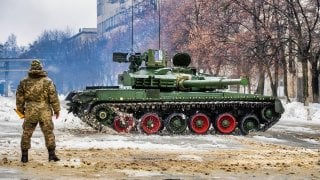Ilan Berman

These are unquestionably difficult times in Kyiv. With Russia’s war of aggression now nearing its two-year mark and on the heels of a less-than-successful military counteroffensive, Western support for Ukraine’s fight appears to be flagging, leaving the country’s government scrambling to shore up international support and resources. The grim state of affairs was palpable in Volodymyr Zelenskyy’s New Year’s interview with The Economist, in which the Ukrainian president beseeched Western governments not to cede the advantage to Russia.
So, how can Kyiv improve its position? A great deal undoubtedly depends on the political state of play in Washington, where additional support for Ukraine has become an increasingly difficult—and partisan—topic. Nevertheless, there are still a number of concrete things that Kyiv can do to shift the global policy debate in its favor.
Publicize internal reforms. Among the most profound transformations that have taken place in Ukraine since the start of Russia’s full-scale invasion has been the start of real, meaningful, and far-reaching domestic reforms. Ukraine’s government, mindful of the need to account for Western aid and eager to eliminate hurdles to eventual EU membership, Kyiv has begun overhauling virtually every sector of its society and economy. This effort includes a drive to root out graft in the nation’s armed forces, revamping the country’s judiciary, and instituting preemptive protections for the post-conflict reconstruction that will inevitably follow today’s war.
Yet those changes are still poorly understood in the West, where the country’s long-running problems with corruption continue to color thinking about its trustworthiness. Changing those perceptions (via a campaign of articles, interviews, and public disclosures) should be a top priority for Kyiv because doing so would go a long way toward dispelling the “Ukraine fatigue” that has set in in many corners and help convince policymakers in Washington and elsewhere that continued support for Ukraine’s cause is a good bet.
Say “No” to China. Russia’s war of aggression has wrought large-scale destruction on the territory of its western neighbor. Consequently, as the BBC has noted, “the task of reconstruction is expected to be the biggest of its kind since World War Two,” with “at least 245,000 buildings” damaged or destroyed as a result of Russia’s offensive. This will unquestionably be a heavy lift in financial terms. A March 2023 estimate by the World Bank put the projected price tag for rebuilding Ukraine at a whopping $411 billion—a figure that has assuredly risen significantly since.
Yet who, precisely, will do the rebuilding? Western governments are the clear frontrunners. However, given this effort’s projected scope, Kyiv’s policymakers are looking at all options—including China, which has excelled at large-scale infrastructure projects over the past decade as part of its vaunted Belt and Road Initiative. Beijing, meanwhile, has signaled its willingness to participate in Ukraine’s eventual restoration.
Such engagement, however, is fraught with peril. In today’s hyper-partisan U.S. political debate, opposition to China is one of the few issues that unite Republicans and Democrats, and closer Kyiv-Beijing ties would undoubtedly sour official Washington on the prospects for deeper investment. The same likely holds in many European capitals, which have adopted an increasingly critical view of the PRC in recent years. In other words, policymakers in Kyiv need to understand that they can have extended engagement with, and extensive investments from, China or the West—but probably not from both.
Broaden the policy conversation. Since the start of the war, Ukrainian president Volodymyr Zelenskyy has risen from relative obscurity to become a household name the world over. His tireless shuttle diplomacy and dogged media engagement have made him the indisputable face of the Ukrainian cause. But Zelenskyy, while still the country’s most popular politician, has his fair share of detractors. Moreover, his standing has begun to slip amid battlefield setbacks and mounting domestic concern over issues like judicial inequality and endemic corruption. Support for Zelenskyy, analysts predict, will erode further still once the war is over and other political hopefuls enter the fray. All of which helps explain why Ukraine’s president has put a premium on maintaining a monopoly on messaging (even going so far as to publicly fall out with top officials who sing a different tune).

That, however, is a mistake. Kyiv needs to field a cadre of authoritative, professional, and capable communicators who can hammer home to skeptics the crucial point that today’s priorities—countering corruption, membership in Europe, and liberal democracy—are those of the nation as a whole. These emissaries, moreover, can play a crucial role in convincing foreign audiences that Kyiv is committed to staying on the Euro-Atlantic course, no matter who ends up guiding the Ukrainian ship of state in the years ahead.
Of course, none of the above necessarily guarantees that Kyiv will regain momentum in its ongoing fight against the Kremlin. What is already clear, however, is that a failure to focus on these areas has not served it well so far.
No comments:
Post a Comment